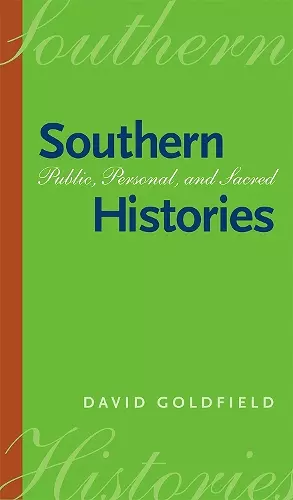Southern Histories
Public, Personal, and Sacred
Format:Hardback
Publisher:University of Georgia Press
Published:24th Nov '03
Currently unavailable, and unfortunately no date known when it will be back

In this challenging look at some of the historical forces actively at work in today's South, David Goldfield draws pointed, provocative links between the "Lost Cause" mythology that emerged from the chaos of Confederate defeat, the region's reputation for intolerance, and southern evangelical Protestantism. History, religion, and culture can be so intertwined in the South, notes Goldfield, that changing one's point of view threatens simultaneously one's ancestry, identity, and salvation.
As he discusses southern religion in a global age, Goldfield ranges from the deliberations of the Southern Baptist Convention to the banning of Satan from Inglis, Florida, by mayoral proclamation in March 2002. He asks whether southerners' defiance of school-prayer prohibitions is an emboldened tactic of a triumphant theocracy or evidence of an increasingly marginal religion gone public with its anxieties.
On the question of who "owns" southern history, Goldfield looks at an array of issues from the Thomas Jefferson-Sally Hemmings controversy to debates over the Confederate flag to the proliferation of African American history museums and monuments in the region. Finally, he recalls his work as a consultant on U.S. Supreme Court cases involving a majority black voting district in North Carolina, as a coauthor of an environmental and economic impact study of offshore drilling in the Gulf of Mexico, and as a mitigating witness in the sentencing phases of six racially polarizing death penalty cases. His contributions, Goldfield hopes, made history more "real" to people in vocations outside of academia.
The sesquicentennial of the Civil War in 2011 looms large for Goldfield. If we can commemorate the war and celebrate southern distinctiveness without being exclusionary, then the anniversary can be an occasion for reconciliation. In any case, he says, the South is rapidly changing, and whoever clings to a selective view of its history risks being left behind.
In accessible and sparkling prose, David Goldfield investigates the real-life consequences of being a southern historian. Can delving into the past change the course of the South's future? Goldfield, who was called as an expert witness in cases ranging from the death penalty to congressional redistricting and challenged to an intellectual duel by neo-Confederates over his interpretation of the Civil War, uses his experiences in and with the South to meditate on public history and the politics of memory; his reflections should be required reading for anyone interested in the future of the South and the nation.
* Johns Hopkins University *With passion and courage, David Goldfield takes on in these essays what it means to write history in and about the South. In tackling religion, race, the relationship of academic to public history, and the historian's own personal relationship to the subjects of place and past, Goldfield brilliantly updates the 'burden' of southern history.
* author of Race and Reunion: The Civil War in American Memory *Goldfield builds on his traditional academic strengths while taking full advantage of the more liberal form of commissioned lectures to offer insights that would perhaps seem out of place in journal articles. . . . Goldfield's contribution is both to lament the gulf between professional historians and average southerners and to urge his historian-readers to make their work known and relevant to the modern South.
A vigorous and eloquent defense of the historian's craft at a time when, and in a region where, ambiguity and nuance are seemingly anathema . . .Without resorting to any deep theory about historical method or elusive truth, Goldfield offers a compelling defense of engaged scholarship that informs public policy on behalf of social justice.
This is a thoughtful little volume, densely packed with insights and observations. . . . Historians should read this, to remind themselves of their importance to contemporary public policy. All historians are in some part ‘public historians.’ Goldfield urges us to act the part.
Few students of the American South are better read in its history and literature than David Goldfield. . . . I admire Goldfield's candor and passion, and the elegance of his prose.
Goldfield combines the field of cultural studies with traditional studies of Southern society and history following the Civil War. . . . The three sections page-for-page offer sharper insights and a quicker and clearer grasp of [the] contemporary South than any other book on this topic.
[A]n interesting collection of essays.
ISBN: 9780820325613
Dimensions: 216mm x 127mm x 17mm
Weight: 304g
140 pages